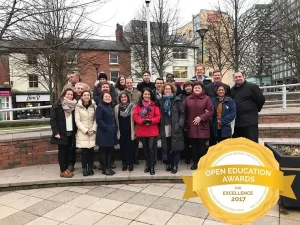Alexandra Okada, Monday 20 February 2017
ENGAGE is a winner of the 2017 OER & Project Awards for Open Education Excellence, which was announced by the global network of Open Education (OEC). Fourteen partners and more than 15,000 open educators in 80 countries, who are members of ENGAGE, are celebrating this award now. The ceremony will be presented at the upcoming OEC Global Conference in Cape Town, South Africa, March 08-10, 2017.
Dr. Okada highlights that the award was made in recognition of a new approach to Open Science Education which promotes Responsible Research and Innovation (RRI). The term RRI, created by the European Commission, refers to the participatory process that aligns scientific innovations to societal needs and expectations. She has just announced to the ENGAGE team that “We are officially leading creative innovations for Science Education to empower teachers through OER and MOOC for equipping the next generation for RRI by connecting non-formal resources (topical science-in-the-news) and informal learning (science networks) with formal education (science curriculum).

The ENGAGE project funded by the European Commission links available knowledge outside the classroom, such as science media that has an impact on citizens’ lives, to create controversial socio-scientific dilemmas that hook learners’ curiosity and their “need to know” in the school. Students think, talk, and develop informed-based views using science connected to their life while interacting with scientists. Through OER and guidelines, teachers support them with 10 inquiry skills for RRI, which are grouped into four areas: inquire, analyze, solve, and communicate. This framework was adopted by the UK national exam board AQA for assessment.
ENGAGE presents a new way of thinking and substantially improves the discoverability, presentation, usability, accessibility, and availability of openness in science education for RRI. It offers contemporary learning materials for students, guidelines for teaching, and open online courses in the OpenEdx MOOC platform for all educators, all under Creative Commons license in 10 languages.
A key challenge in Science Education, which ENGAGE was designed to tackle “for promoting critical scientific literacy, and for learning about science, scientists, scientific inquiry, and scientific argumentation, is the need to furnish students with the knowledge, skills, and attitudes to address socio-scientific and environmental issues in a critical way and to reach informed decisions on a range of science-related and technology-related issues that impact them, their immediate family and friends, the surrounding local, national, and global community, and the planet as a whole (Hodson).
ENGAGE researchers are taking into account possible gender and geographical differences in Europe, including also the analysis of projects developed by socio-economically disadvantaged groups in remote areas of Brazil and Africa. Various studies in Brazil, Lithuania, Spain, and Romania use the LiteMap tool for collaborative argumentative visualization developed in KMi. New interdisciplinary research about children’s health and wellbeing in the UK and Brazil is currently in development based on ENGAGE materials related to ZIKA virus, Vitamin D, Sugary Drinks, e-Cigarettes, and Text neck (smartphones).
The ENGAGE team led by Dr. Sherborne elaborated more than 30 OERs based on contemporary science linked to various topics: Earth, Ecosystem, Electromagnetism, Energy, Forces, Genes, Matter, Organisms, Reactions, and Waves. Dr. Okada coordinated a MOOC on pedagogical tools and inquiry skills for RRI for pre-service and in-service teachers, delivered by 11 partners, and co-authored a course book, various research papers, and policy reports. Currently, the ENGAGE portal has more than 3,500 comments, 130,000 downloads, and 675,000 views.
ENGAGE Team, well done!
Related Links:
